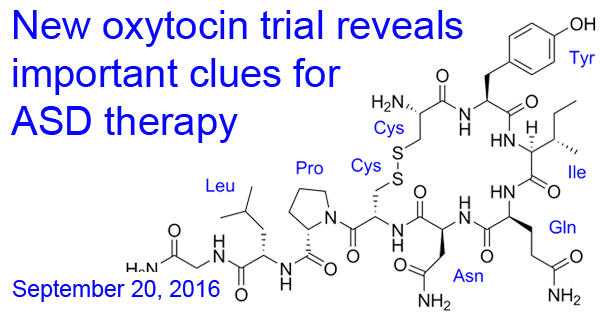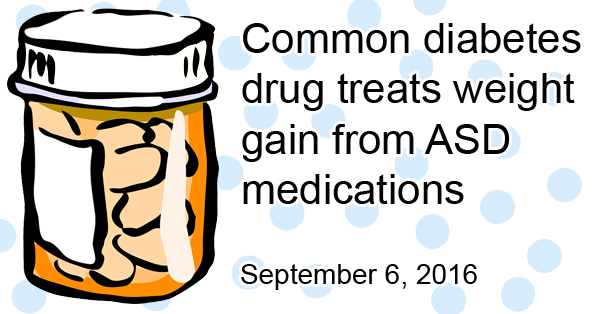Archives
September, 2016
Select a different month in the archive
Dosage and DNA Matter for Oxytocin to Work for ASD
By Shana R. Spindler, PhD on September 21, 2016

Background: Oxytocin is a small hormone that regulates diverse physiological responses and social behaviors in mammals, including humans. The brain’s neurons recognize the hormone and start a chain of events that lead to emotion recognition and feelings of attachment. This in turn influences social bonding and related behaviors. Because of its powerful effect on the social brain, several studies have tested oxytocin as a treatment for the core symptoms of Autism Spectrum Disorder (ASD), with some success so far.
What’s new: A clinical trial examined two important aspects of oxytocin treatment:
- Dosage levels
- Genetic variations in the oxytocin receptor.
In a randomized clinical trial, researchers gave high- or low-dose oxytocin nose spray, or a placebo, to 20 young adults with ASD per group for 12 weeks. The high-dose oxytocin significantly helped social symptoms in males, but not females. The researchers found that high-dose oxytocin helped males focus on social regions of the face, such as the eyes, and on biological motions. Low-dose helped only those who had a specific DNA variation in the oxytocin receptor gene.
Why it’s important: Researchers can use the results from this clinical trial to help design future trials of oxytocin therapy for ASD. Dosage amounts and a person’s genetic background appear to be important factors to consider during future studies.
Help me understand :
| Source(s) : |
| Tweet |
Diabetes Drug May Balance Weight Gain from ASD Meds
By Chelsea E. Toledo, M.A. on September 6, 2016

Background: Along with the hallmark symptoms of differences in communication and social behavior, many children with autism spectrum disorder (ASD) suffer from irritability. The U.S. Food and Drug Administration, or FDA, has approved two drugs - risperidone and aripiprasole (types of atypical antipsychotics) - to treat irritability associated with ASD in children. One common side effect of these drugs is significant weight gain.
What’s New: A new clinical trail has examined efficacy of another drug for reducing weight in children diagnosed with ASD and taking atypical antipsychotic drugs for irritability. Over the course of 16 weeks, the researchers conducted a randomized, controlled clinical trial in which they administered either a placebo or metformin - commonly used to treat diabetes - to 60 children between the ages of 6 and 17 with ASD who had experienced weight gain while taking an atypical antipsychotic drug. They found that the group taking metformin experienced significant weight loss, with reductions between 5 and 9 percent of their body mass index.
Why it’s important: This study suggests that the use of metformin could balance out the weight gain experienced by children taking atypical antipsychotics for irritability in ASD - helping them to have healthier outcomes. Future studies could determine whether this treatment is effective at maintaining weight loss, and whether it could prevent weight gain at the start of atypical antipsychotic drug treatment.
This study was published on August 24, 2016, in the scientific journal JAMA Psychiatry.
Help me understand :
| Source(s) : |
| Tweet |

